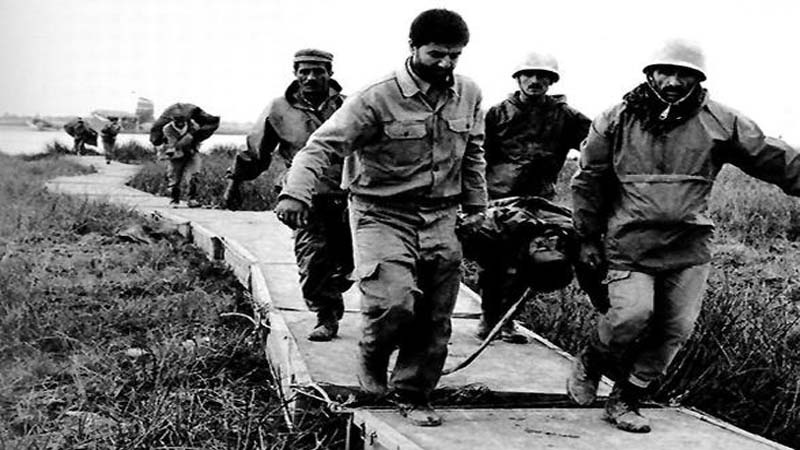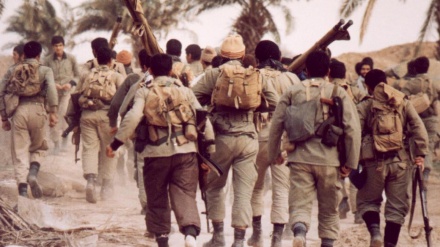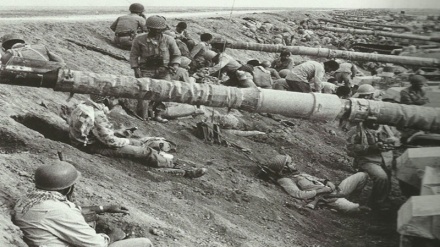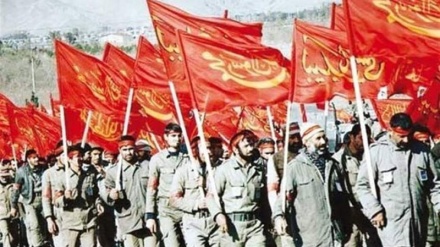Glimpses of Epic of 8-Year Holy Defense (41)
In the previous program we talked about the achievements and consequences of the great Bayt ul-Moqaddas operation. The operation was launched with the aim of liberating the regions which had been under Iraqi occupation since September 1980, especially the strategic port of Khorramshahr. With the completion of Bayt ul-Moqaddas operation and liberation of Khorramshahr almost all of the regions in the southwest of Iran were liberated. The operation changed the general nature of Iran-Iraq war.
In the period between September 1980 till September 1981 the Islamic Republic of Iran didn't succeed in much of the efforts to launch major operations and the Iraqi army had many of the regions under occupation. Political instability inside the country and lack of necessary military ability to liberate the occupied regions were two distinctive features during this period. Such a situation obstructed the Iranian forces in many arenas, so that the enemies of the Islamic Revolution, both inside the country and abroad, hoped that the Islamic Republic would eventually accept their conditions in the form of an imposed peace. Considering the US and Iraqi intentions, war was deemed as a means of political and military pressure to overthrow or curb the Islamic Republic. The tool to achieve this goal was to exert political and military pressures on Iran at regional and international level besides the military invasion of the Iraqi regime. The enemies of the Islamic Republic dreamt of toppling the nascent Islamic system and exterminating the Islamic Revolution as the country was in turmoil internally.
Washington's satisfaction with Saddam and the war it had imposed on the Islamic Republic of Iran led the US and its allies in the west pin their hope on the surrender of the Islamic Iran. Thus, they were immersed in daydreaming of the collapse of the Islamic Republic. To materialize this illusion, the United States wielded its illegal power and authority in the UN besides full military support for Iraq to achieve its nefarious goals.
However, with the victory of the Iranian people over different conspiracies of the west and the east and thwarting of plots hatched by anti-revolutionary elements inside the country, the political and military equations changed to the favor of the front of the revolutionary masses. So, the liberation of nearly 10,000 square kilometers of occupied regions and Khorramshahr further bolstered Iran's position in the region and the world. Changing the politico-military balance in favor of Iran was a substantial development in the war. Earlier, Iran was in a defensive position against Iraq and part of its territory was in the occupation of the Ba'athist enemy. On one hand, Iran was not able to liberate the occupied regions; and on the other hand, acceptance of an imposed peace was in utter contrast to the ideals and goals of Islam and the Islamic Revolution. Alteration of this trend and the bewilderment of Iraq against the surprise attacks of Iranian brave combatants was not only unexpected but it was unacceptable for Saddam's masters in the west and the east and his supporters in the region. Any change in the balance of power would translate into a threat to the US's illegitimate interests in the Persian Gulf and West Asia. The Great Satan (the US) and its allies –comprising the European regimes and the regional Arab myrmidons- couldn’t see the weakening and ultimately fall of the Iraqi regime, as they had heaped up their support and spent gargantuan amounts of money to save the Iraqi dictator.
The experts and officials of different countries were astounded at the new phase of the imposed war. However, all the comments and analyses stressed that Iran's victory in Bayt ul-Moqaddas operation was going to determine the fate of war for good as the British daily Guardian described the victory as a turning point in the war between the two countries and the French daily Le Monde also emphasized that "the battle of Khorramshahr will determine the fate of war." Financial Times wrote: "Khorramshahr is tantamount to victory in the war, and Khorramshahr is the only real symbol of the Iraqi victory and symbolizes the stiff resistance of the Iranian forces."
A western diplomat in Baghdad said: “Khorramshahr is a great prize, if the Iranians retake it, the Iraqis will have no say.” The Associated Press evaluated the fall of Khorramshahr as a real and humiliating defeat for Saddam’s regime in the 20-month war. Radio London, quoting from experts, considered the victory in Khorramshahr as one of the greatest victories in Iran. In other analyses on the impacts of Iraq's defeat in Bayt ul-Moqaddas operation, these were some of the phrases published by various news agencies, "humiliating the Iraqi army", "losing Iraq's greatest and most important motive", "Iraqi oil fields within the reach of Iran's shots" and "Iran's ability to advance to the border and inside Iraq ". The likely collapse of Saddam and its consequences at the Persian Gulf had so wide dimensions that all military and diplomatic efforts of the supporters of Iraq were concentrated on preventing his collapse. The US warned the Persian Gulf Sheikhdoms, especially his minions in Kuwait, the UAE and Qatar against the repercussions of Saddam's fall. In fact, the Great Satan sort of assured the Arab reactionary regimes that it would not allow a definitive victory for Iran.
A few days after liberation of Khorramshahr in May 1982, the Americans in a symbolic move issued the authorization of the sale of 6 transportation planes to Iraq. This, while such a move was banned because of Iraq's inclusion in the list of the countries supporting terrorism.
Part of the US policies after liberation of Khorramshahr was disclosed years after the end of the imposed war. Saddam's son-in-law, Hussein Kamel, after taking refuge in Jordan in 1996, was interviewed by the Lebanese newspaper As-Safir about the American position after the liberation of Khorramshahr. He said: "At that time, Saddam was very disturbed and could rest except with taking calm tablets and drugs. Meanwhile, the US envoy, William Johnson, went to Iraq and met with Saddam and promised that if he could prevent Iran's victory in the war and could succeed in changing the balance of the war in favor of himself, the Americans would give him Kuwait." Hussein Kamel said that hearing this promise, gladdened Saddam very much. He restored his spirit and said that, if necessary, he would sacrifice all the Iraqi army to get Kuwait.
RM/SS



